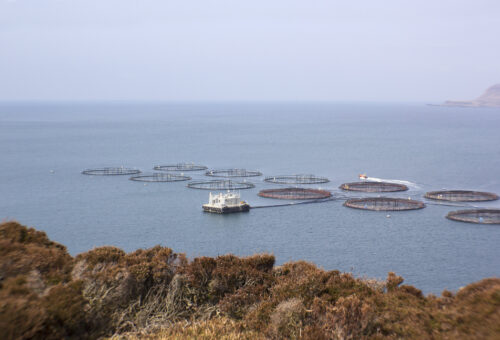The Scottish salmon sector is wrestling with three challenges that are holding back the industry, as the global impact of the Russia-Ukraine conflict, post-Brexit changes and regulatory issues combine to impact producers.
Speaking exclusively to SalmonBusiness, Salmon Scotland Chief Executive Tavish Scott warned that the regional industry is facing a mixture of pressures, as rising fuel prices, around £3 million of post-Brexit costs per year and burdensome red tape cut into the financial resources of producers.
Rising production costs
With 61 percent of global Scottish salmon exports being delivered to the EU, the vast majority of producers in Scotland transport their fish via road. So, rising fuel costs increase the financial pressure on producers seeking to transport their goods in lorries to the continent. Similarly, the cost of raw materials has risen due to the conflict between Russia and Ukraine, causing more headaches for producers.
While Scott states that Scotland only exported a small portion of salmon to Ukraine and hasn’t exported salmon to Russia since the 2014 invasion of Ukraine, Scottish producers did source “soya, rapeseed oil and wheat from Ukraine,” which now won’t be available for the foreseeable future.
With prices rising, Scott noted that some costs are being absorbed by companies, with the freight industry and producing companies taking a hit of the rising production costs but on the other side some costs are being passed on to consumers, forcing salmon to be more costly.
Other entities have experienced similar issues, with the CEO of Ocean Freight Specialist Ocean Supreme, Botholf Stolt-Nielsen, raising concerns about the growing cost of air freight, as the war in Ukraine has doubled the cost of shipping salmon. “The question is how long this will be, whether it will be a permanent situation or whether it will be for a period,” Botholf Stolt-Nielsen told NRK Møre og Romsdal.
Read also: Scottish salmon to fill trade void after Russian exports are hit by sanctions over Ukraine
Post-Brexit impact
Even without the conflict in Europe, Scott warned that the salmon industry in Scotland was already facing the “thick end of £3 million of extra costs per annum because of the paper work and the bureaucracy” that Scottish companies were hit with.
In a further warning, Scott highlighted how “an additional 12% of costs” are set to be laid on Scottish salmon producers by food standards “for the work they do at the logistics hubs in Scotland prior to the salmon being exported.”
To help protect Scottish industries, Scott called on the UK government to cover the post-Brexit costs due to the assurance that had been made of a digital export system that would’ve eliminated a lot of the extra financial burden imposed through the bureaucracy. Salmon Scotland is set to meet with ministers in Scotland to discuss the situation in the coming days but, as of yet, no timescale has been provided on when the situation is expected to improve.

Regulatory pressures
Post-Brexit rules aren’t the only bureaucracy that Scott warned the industry is being forced to struggle with. “There’s no doubt, and the Griggs reports demonstrates this, that the regulatory environment in Scotland at the moment is not conducive to the sustainable growth of the sector,” Scott stated.
The Griggs report, an independent review of the current regulatory framework for Scottish aquaculture, laid out how the individuals and organisations spoken to during his investigation found the region’s “current regulatory system for aquaculture is not fit for purpose.”
Scott agreed with this position, stating that, “instead of having four regulators acting independently of each other and hardly speaking,” Scottish authorities should stick them “under one umbrella where everone knows where the buck stops.”
The current process is “ridiculously long” and time consuming, limiting the ability of salmon producers to grow at a comparable rate to their Scandinavian competitors, Scott feared. Despite there seemingly being political support for the sector and its continued development, due to its importance to Scotland, Scott claimed “bureaucratic inertia within regulators” has slowed any progress or improvements to the current system.
Growing Scottish market
Despite the challenges facing the Scottish salmon industry, Scott highlighted the positive situation for the region, as export statistics show that there is a “rising trend for demand in the European marketplace, norther America and indeed in other emerging markets, such as China and Japan.”
“We’re selling more salmon into France now than we did before Brexit and those numbers are encouraging also in most of the other European markets,” Scott said, citing how he believed people are looking for “quality protein” which is provided by Scottish salmon.
Salmon Scotland is “working very closely with Scottish development international and the UK department of trade” to promote salmon in the longer haul markets, having had a “two year delay” to the industry’s growth due to the dual hit of Brexit and the Covid pandemic.

